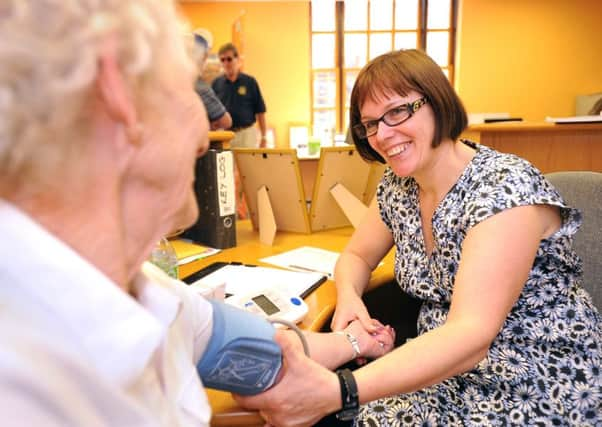HEALTH AND CARE: Get to know your numbers


High blood pressure rarely has any symptoms; the only way for people to know if they have the condition is to have their blood pressure measured.
From September 12 to 18 the charity Blood Pressure UK is running its blood pressure testing and awareness campaign to get people to have their blood pressure checked.
Advertisement
Hide AdAdvertisement
Hide AdIt is important to know your blood pressure numbers in the same way as your height and weight because high blood pressure is a risk factor for stroke, heart attack, heart failure and kidney disease.
Blood pressure is recorded with two numbers – the systolic pressure (higher number) is the force at which your heart pumps blood around your body and the diastolic pressure (lower number) is the resistance to the blood flow in the blood vessels. They’re both measured in millimetres of mercury (mmHg).
As a general guide:
• High blood pressure is considered to be 140/90mmHg or higher.
• Ideal blood pressure is considered to be between 90/60mmHg and 120/80mmHg.
Advertisement
Hide AdAdvertisement
Hide Ad• Low blood pressure is considered to be 90/60mmHg or lower.
A blood pressure reading between 120/80mmHg and 140/90mmHg could mean you are at risk of developing high blood pressure if you do not take steps to keep your blood pressure under control.
There are lots of different ways you can have a significant impact on your blood pressure and reducing your blood pressure can make a massive difference to your health.
The following steps towards a healthier lifestyle will help lower your blood pressure and keep it at a healthy level.
Advertisement
Hide AdAdvertisement
Hide Ad• Exercise – do at least 30 minutes of exercise five times a week, such as walking, dancing, cycling, or swimming. If you’re not used to exercising, don’t start too quickly. Talk to your doctor about how much exercise will suit you, and build up slowly.
• Healthy Eating – a healthy balanced diet will help reduce your blood pressure. A healthy diet includes eating less salt, less saturated fat and aiming for five portions of fruit and vegetables a day.
• Lose Weight – Exercising and eating healthily will help you lose weight. Obesity increases your risk of high blood pressure, so it’s important to be a healthy weight.
Also, if you also limit your alcohol intake and give up smoking it can all help support you in living a healthy lifestyle.
Advertisement
Hide AdAdvertisement
Hide AdYou can find out more about high blood pressure and the support available to help you make lifestyle changes at: www.nhs.uk/livewell
You can also find your nearest pressure station by visiting: www.bloodpressureuk.org
---
Don’t miss out on all the latest breaking news where you live.
Here are four ways you can be sure you’ll be amongst the first to know what’s going on.
1) Make our website your homepage
2) Like our Facebook page
3) Follow us on Twitter
Advertisement
Hide AdAdvertisement
Hide Ad4) Register with us by clicking on ‘sign in’ (top right corner). You can then receive our daily newsletter AND add your point of view to stories that you read here.
And do share with your family and friends - so they don’t miss out!
Always the first with your local news.
Be part of it.